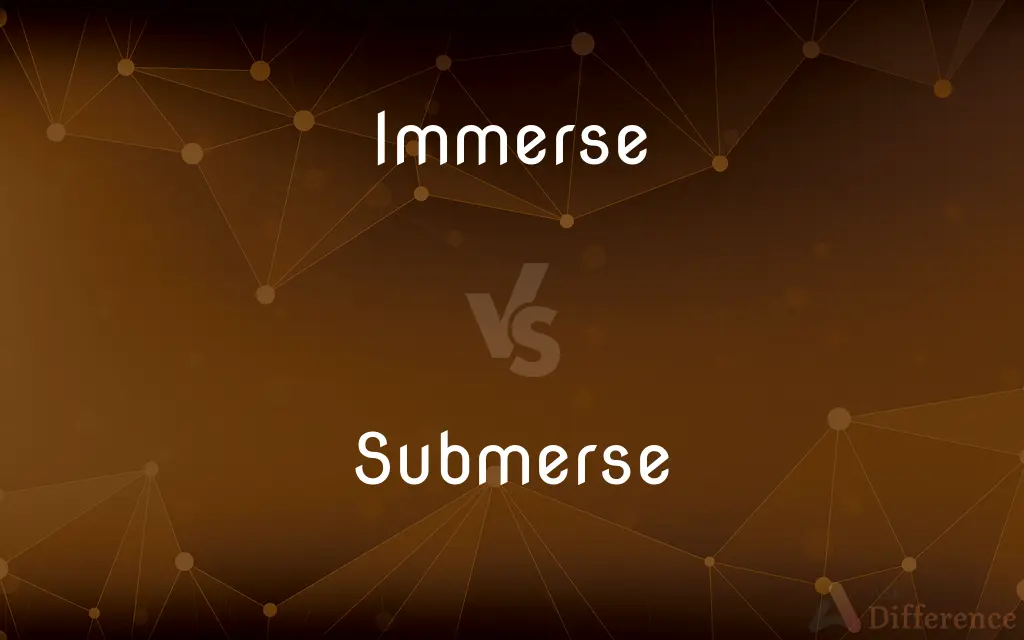Immerse vs. Submerse — What's the Difference?
Edited by Tayyaba Rehman — By Urooj Arif — Updated on April 1, 2024
Immerse involves placing something in a liquid or engaging deeply in an activity, whereas submerse is primarily about placing completely under water.

Difference Between Immerse and Submerse
Table of Contents
ADVERTISEMENT
Key Differences
Immerse often implies involvement in an activity or subject to a deep extent, providing a sense of being surrounded or fully absorbed by it. This can apply to physical immersion in a liquid or metaphorical immersion in tasks. On the other hand, submerse is more specifically used to describe an object being placed or going entirely under the surface of a liquid, especially water, without the connotations of engagement or absorption beyond the physical act.
Immerse is commonly used in contexts that involve both physical and metaphorical immersion. Physically, it can mean dipping something into a liquid until covered. Metaphorically, it denotes deep mental or emotional engagement. Submerse, however, is less frequently used and typically reserved for situations that strictly involve physical submersion, often with an emphasis on the completeness of the action.
In educational or recreational settings, "immerse" is used to describe comprehensive involvement in a subject or activity, like language immersion programs, which are designed to teach through complete engagement in the language environment. Conversely, "submerse" rarely finds application in such contexts, as its usage is limited to describing the action of going underwater.
Technologically and scientifically, the term "immerse" can also refer to the process of immersing equipment or materials in a fluid for testing or operational purposes. Whereas "submerse" might be used in very specific scientific or technical contexts to describe objects being fully underwater, emphasizing the depth or thoroughness of submersion.
"Immersed" can describe someone deeply absorbed in a cultural experience, allowing for a nuanced understanding and appreciation of cultural practices. "Submerse" does not typically apply in these contexts, as it lacks the metaphorical depth associated with cultural immersion.
ADVERTISEMENT
Comparison Chart
Definition
To involve deeply in a particular activity or interest, or to dip in liquid.
To put or go under the surface of water or liquid completely.
Usage
Both metaphorically (in activities) and physically (in liquids).
Primarily physical, with emphasis on complete coverage.
Common Contexts
Education, technology, culture.
Scientific, technical settings.
Connotation
Deep engagement or absorption.
Full submersion without the implication of engagement.
Examples
Language immersion programs; immersing oneself in a book.
Submersing a submarine; a device tested for water resistance.
Compare with Definitions
Immerse
To dip or sink something into a liquid until it is covered.
She immersed the fabric in dye to change its color.
Submerse
To overwhelm or flood.
The town was submersed after the dam broke.
Immerse
To become completely involved in an activity or interest.
He immersed himself in the study of classical music.
Submerse
To place or sink something completely under water or another liquid.
The experiment required submersing the samples in a solution.
Immerse
To involve oneself deeply in a particular culture or environment.
Travelers can immerse themselves in the local culture for a more authentic experience.
Submerse
To hide or disappear by going below the surface.
As the sun set, the island seemed to submerse into the ocean.
Immerse
To baptize someone by dipping them into water.
The followers were immersed in the river as a symbol of purification.
Submerse
To cover or engulf completely.
In his grief, he felt submersed in sorrow.
Immerse
To absorb or engross the mind completely.
The novel was so engaging that she was immersed in it for hours.
Submerse
To go underwater.
The diver submersed without hesitation.
Immerse
Dip or submerge in a liquid
Immerse the paper in water for twenty minutes
Submerse
To submerge.
Immerse
Involve oneself deeply in a particular activity
She immersed herself in her work
She was still immersed in her thoughts
Submerse
To submerge.
Immerse
To cover completely in a liquid; submerge.
Submerse
(botany) Growing entirely under water.
Immerse
To baptize by submerging in water.
Submerse
Submersed.
Immerse
To engage wholly or deeply; absorb
Scholars who immerse themselves in their subjects.
Submerse
Sink below the surface; go under or as if under water
Immerse
(transitive) To place within a fluid (generally a liquid, but also a gas).
Archimedes determined the volume of objects by immersing them in water.
Submerse
Put under water;
Submerge your head completely
Immerse
(transitive) To involve or engage deeply.
The sculptor immersed himself in anatomic studies.
Immerse
To map into an immersion.
Immerse
(obsolete) Immersed; buried; sunk.
Immerse
Immersed; buried; hid; sunk.
Immerse
To plunge into anything that surrounds or covers, especially into a fluid; to dip; to sink; to bury; to immerge.
Deep immersed beneath its whirling wave.
More than a mile immersed within the wood.
Immerse
To baptize by immersion.
Immerse
To engage deeply; to engross the attention of; to involve; to overhelm.
The queen immersed in such a trance.
It is impossible to have a lively hope in another life, and yet be deeply immersed inn the enjoyments of this.
Immerse
Thrust or throw into;
Immerse yourself in hot water
Immerse
Engross (oneself) fully;
He immersed himself into his studies
Immerse
Enclose or envelop completely, as if by swallowing;
The huge waves swallowed the small boat and it sank shortly thereafter
Immerse
Cause to be immersed;
The professor plunged his students into the study of the Italian text
Common Curiosities
What does it mean to immerse yourself in something?
To immerse yourself means to become deeply involved or engaged in an activity, subject, or culture.
Is submerse a real word?
Yes, submerse is a real word, often used to describe something being completely placed under water.
What does it mean to submerse a plant?
To submerse a plant means to place it completely under water, which is common in aquatic plant care.
Can you be immersed in water?
Yes, you can physically immerse something or yourself in water, meaning to dip or place it completely in the liquid.
Is it correct to say "immerse in water" for objects?
Yes, it's correct to say "immerse in water" when referring to placing objects completely in water.
Can immersion be used in a spiritual context?
Yes, immersion can be used in a spiritual context, such as being immersed in meditation or religious practices.
How do you use immerse in a sentence?
"She immersed herself in learning French, attending classes and speaking exclusively in the language."
What is the difference between immersed and submerged?
Immersed can refer to both physical and metaphorical involvement, whereas submerged is similar to submersed, emphasizing complete coverage under a liquid.
How is submerse used in scientific contexts?
In scientific contexts, submerse might describe experiments where objects must be fully submerged in a solution to observe reactions.
What does it mean to be emotionally immersed?
Being emotionally immersed means deeply feeling or connecting with an emotional experience or narrative.
What is a submersible vehicle?
A submersible vehicle is designed to be operated underwater, capable of being submerged and functioning at depths.
Is it better to immerse or submerse electronic devices for testing?
For electronic devices, manufacturers might immerse them in controlled environments to test water resistance, rather than submerse without specific testing purposes.
Can you immerse yourself in a video game?
Yes, you can immerse yourself in a video game by deeply engaging with its world, characters, and mechanics.
Can culture be submersed?
Culturally, the term "submersed" isn't commonly used. "Immersed in culture" is the preferred expression for deep cultural engagement.
How does immersion help in learning a new language?
Immersion helps in language learning by surrounding the learner with the language in various contexts, promoting faster and more natural acquisition.
Share Your Discovery

Previous Comparison
Befriend vs. Friend
Next Comparison
Fair vs. PaleAuthor Spotlight
Written by
Urooj ArifUrooj is a skilled content writer at Ask Difference, known for her exceptional ability to simplify complex topics into engaging and informative content. With a passion for research and a flair for clear, concise writing, she consistently delivers articles that resonate with our diverse audience.
Edited by
Tayyaba RehmanTayyaba Rehman is a distinguished writer, currently serving as a primary contributor to askdifference.com. As a researcher in semantics and etymology, Tayyaba's passion for the complexity of languages and their distinctions has found a perfect home on the platform. Tayyaba delves into the intricacies of language, distinguishing between commonly confused words and phrases, thereby providing clarity for readers worldwide.















































